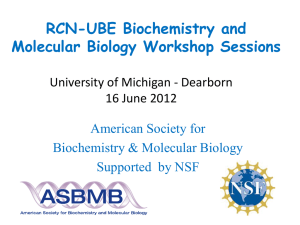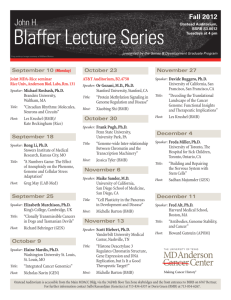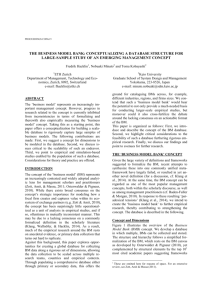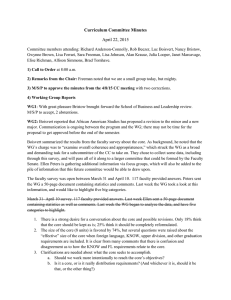Assessment Report Standard Format July 1, 2009-June 30, 2010 PROGRAM ASSESSED:
advertisement
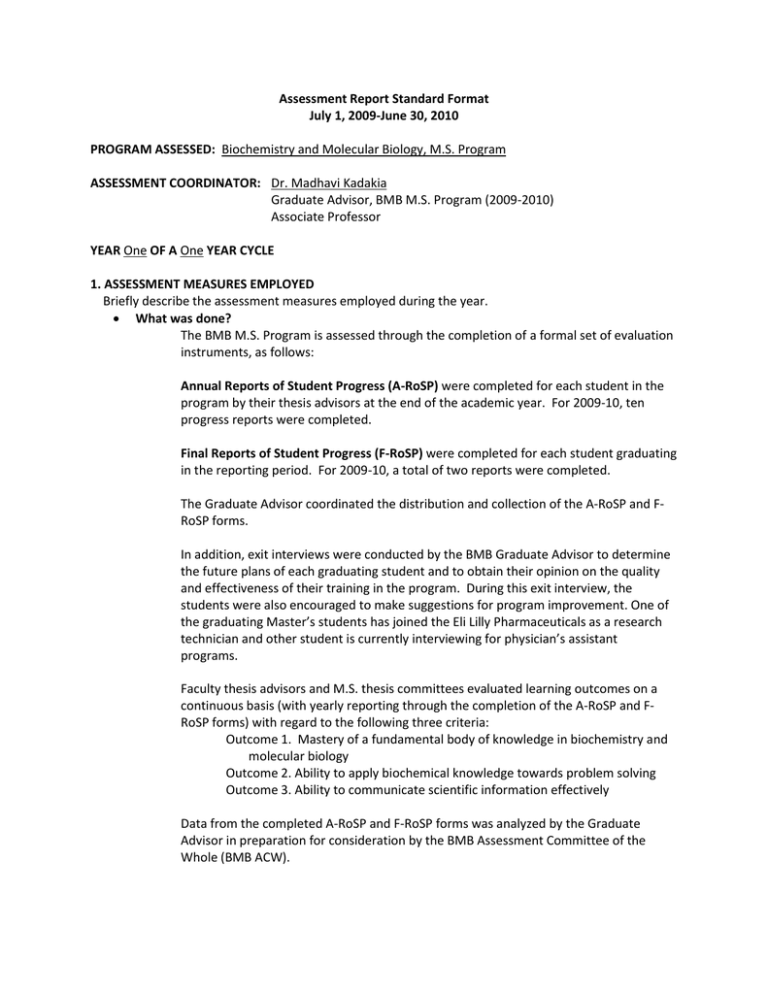
Assessment Report Standard Format July 1, 2009-June 30, 2010 PROGRAM ASSESSED: Biochemistry and Molecular Biology, M.S. Program ASSESSMENT COORDINATOR: Dr. Madhavi Kadakia Graduate Advisor, BMB M.S. Program (2009-2010) Associate Professor YEAR One OF A One YEAR CYCLE 1. ASSESSMENT MEASURES EMPLOYED Briefly describe the assessment measures employed during the year. What was done? The BMB M.S. Program is assessed through the completion of a formal set of evaluation instruments, as follows: Annual Reports of Student Progress (A-RoSP) were completed for each student in the program by their thesis advisors at the end of the academic year. For 2009-10, ten progress reports were completed. Final Reports of Student Progress (F-RoSP) were completed for each student graduating in the reporting period. For 2009-10, a total of two reports were completed. The Graduate Advisor coordinated the distribution and collection of the A-RoSP and FRoSP forms. In addition, exit interviews were conducted by the BMB Graduate Advisor to determine the future plans of each graduating student and to obtain their opinion on the quality and effectiveness of their training in the program. During this exit interview, the students were also encouraged to make suggestions for program improvement. One of the graduating Master’s students has joined the Eli Lilly Pharmaceuticals as a research technician and other student is currently interviewing for physician’s assistant programs. Faculty thesis advisors and M.S. thesis committees evaluated learning outcomes on a continuous basis (with yearly reporting through the completion of the A-RoSP and FRoSP forms) with regard to the following three criteria: Outcome 1. Mastery of a fundamental body of knowledge in biochemistry and molecular biology Outcome 2. Ability to apply biochemical knowledge towards problem solving Outcome 3. Ability to communicate scientific information effectively Data from the completed A-RoSP and F-RoSP forms was analyzed by the Graduate Advisor in preparation for consideration by the BMB Assessment Committee of the Whole (BMB ACW). Who participated in the process? The BMB Graduate Advisor coordinated the assessment process through the distribution of the A-RoSP/F-RoSP forms and subsequent analysis of the resulting data. For 2009-10, the assessment forms were completed for all of the students enrolled (or graduated) in the BMB M.S. Program. At the Annual BMB Faculty Retreat held August 25, 2010, the entire BMB faculty participated in the assessment process acting as the BMB Assessment Committee of the Whole (BMB ACW). Dr. Madhavi Kadakia (who is the BMB Graduate Advisor for 20092010) presented the formal report on the M.S. Program using the collected assessment data and led the discussion of the program. The entire BMB faculty (BMB ACW) evaluates, discusses and makes program recommendations during the annual BMB retreat. What challenges (if any) were encountered? None. There was 100% faculty compliance in completion of both the annual and final reports of student progress. 2. ASSESSMENT FINDINGS List the objectives and outcomes assessed during the year, and briefly describe the findings for each. OBJECTIVES (as outlined in the BMB Assessment Plan of 5/28/2004): -Entrance into doctoral level academic programs. -Employment in industries or governmental agencies that employ scientific personnel where expertise in Biochemistry or Molecular Biology is required. -Employment in a teaching position where experience in Biochemistry or Molecular Biology is required. -The Master’s Degree program will prepare students for further work in Biochemistry and Molecular Biology. - Entrance into Medical School and masters program enables the students to be better prepared. Findings: Our graduating M.S. students continue to be successful in obtaining research positions ranging from academic to industrial research settings. Survey responses from the faculty and student feedback indicates that the training received in the BMB M.S. Program has provided our students with the needed expertise for their jobs. The specialized research training received by the students in their thesis research continues to be a valuable asset for job hunting by our M.S. graduates. The progress of these M.S. Program graduates will continue to be tracked as they move forward in their careers. LEARNING OUTCOMES (as originally stated in the BMB Assessment Plan of 5/28/2004): Outcome 1: Mastery of a fundamental body of knowledge in Biochemistry and Molecular Biology. Findings for Outcome 1: Based on analysis of the data from the assessment tools (A-RoSP and R-RoSP forms) and discussion of the data by the BMB faculty (as the BMB ACW at the Annual BMB retreat), there was agreement of the BMB ACW that the students are making excellent progress regarding this outcome overall and in each of the five Outcome 1 subcategories assessed. Outcome 2: Ability to apply biochemical knowledge towards problem solving. Findings for Outcome 2: The assessment data and the BMB ACW discussion indicated that all Outcome 2 subcategories have been achieved and that the students are performing at an excellent level in this regard. Outcome 3: Ability to communicate scientific information effectively. Findings for Outcome 3: There are four subcategories for this Outcome. The BMB ACW agreed that all four Outcome 3 subcategories were achieved. For the past year, enhancements to the weekly BMB Brown Bag research presentation program were continued based on prior BMB ACW recommendations. This has provided the students with an excellent opportunity to master their presentation skills and present their research. Furthermore, Master’s program students have presented at national and international meetings. In addition, presentations have been made at both the annual Biomedical Science PhD program retreat and the Central Research Forum held by Boonshoft School of Medicine at Wright State University. 3. PROGRAM IMPROVEMENTS No major changes to the program were recommended by the BMB-ACW. The BMB ACW did approve a formal requirement that M.S. students must have a thesis committee selected and hold an initial meeting by the end of their first year. This recommendation has been followed with the students who enrolled in 2009. In addition a new committee was formed to go over the changes required for the program of study for quarter to semester transition. An annual survey of the BMB faculty gauging their interest in serving as thesis advisors for new M.S. students (for the next academic year) was again conducted in 2009-2010 and provided useful information in guiding enrollment decisions by the BMB M.S. Admissions Committee. 4. ASSESSMENT PLAN COMPLIANCE The BMB M.S. Program Assessment Plan is in compliance with all aspects of the original plan. 5. NEW ASSESSMENT DEVELOPMENTS None. The assessment plan (final version dated May 28, 2004) was fully implemented for the 2009-2010 academic year.
